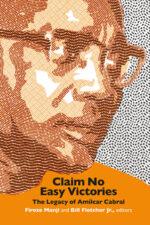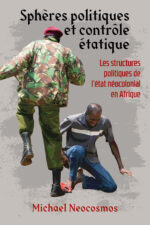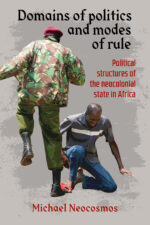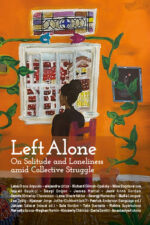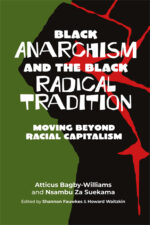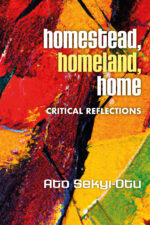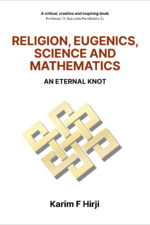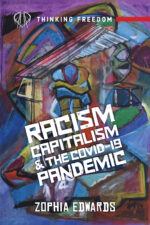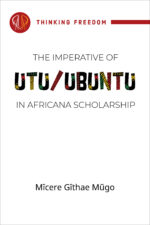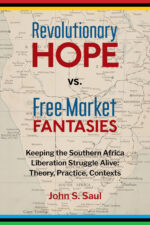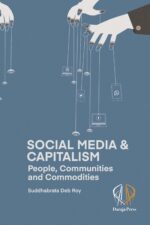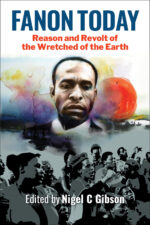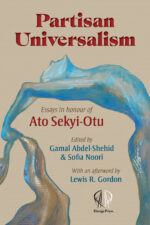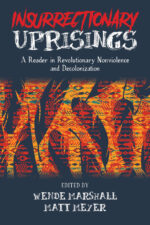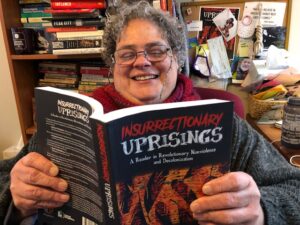-
“Nada mal para um N—, Não?” “No está mal para un N—, ¿no?”
Escrito durante as comemorações do septuagésimo quinto aniversário da publicação de Black Skin, White Masks (“Pele Negra, Máscaras Brancas”), de Frantz Fanon, “Not Bad for a N—, No?” oferece reflexões sobre as circunstâncias da publicação desta obra clássica com os insights de Fanon sobre o que ele chamou de tentativa de “assassinato do homem” e a necessidade urgente de a humanidade se tornar “acional”.
Escrito durante las celebraciones del septuagésimo quinto aniversario de la publicación de Black Skin, White Masks (“Piel negra, máscaras blancas”) de Frantz Fanon, “Not Bad for a N—, No?” ofrece reflexiones sobre las circunstancias de la publicación de esta obra clásica con las ideas de Fanon sobre lo que llamó el intento de “asesinato del hombre” y la urgente necesidad de que la humanidad se vuelva “acción”.
-
“Not Bad for a N—, No?” / «Pas mal pour un N—, n’est-ce pas? »
Written during the seventy-fifth anniversary celebrations of the publication of Frantz Fanon’s Peau noir, masques blancs (“Black Skin, White Masks”), “Not Bad for a N—, No?” offers reflections on the circumstances of the publication of this classic work with Fanon’s insights on what he called the attempted “murder of man” and the urgent need for humanity to become “actional.”
Écrit lors des célébrations du soixante-quinzième anniversaire de la publication de Frantz Fanon de Peau noir masques blancs, «Pas mal pour un N—, n’est-ce pas? » offre des réflexions sur les circonstances de la publication de cette œuvre classique avec les idées de Fanon sur ce qu’il a appelé la tentative de «meurtre de l’homme» et le besoin urgent que l’humanité devienne «actionnelle».
-
Claim No Easy Victories: The Legacy of Amilcar Cabral (NEw & Expanded edtion)
USD $ 26.00“Never has it been more certain that our victory depends principally on our own actions. Tell no lies, claim no easy victories . . .” —Amílcar Cabral On the centennial of Amílcar Cabral’s birth, and fifty years after his passing, Claim No Easy Victories brings to life the resonance of his thought for today’s freedom movements. World-renowned revolutionary, poet, liberation philosopher, and leader of the anticolonial independence movement of Guinea Bissau and Cape Verde, Amílcar Cabral’s legacy stretches well beyond the shores of West Africa. His profound influence on the pan-Africanist movement and the Black liberation movement in the United States and the English-speaking world spans the ages—and is only growing in an era of renewed anti-imperialist internationalist struggle. In this unique collection of essays, radical thinkers from across Africa, the United States, and internationally commemorate Cabral’s life and legacy and his relevance to contemporary struggles for self-determination and emancipation. Claim No Easy Victories serves equally as an introduction or reintroduction to a figure and militant history that the rulers and beneficiaries of global racial capitalism would rather see forgotten. Understanding Cabral then and now sheds light on the necessity of grounding radical change in the creation of theory based on the actual conditions within which movements develop. The depth and dimension of Cabral’s theoretical ideas and revolutionary practice of building popular movements for liberation are assessed by each of the authors and critically reanimated for a new generation of freedom fighters. The book features contributions by: Kali Akuno, Samir Amin, David Austin, Jesse Benjamin, Angela Davis, Bill Fletcher Jr, Mireille Fanon-Mendès France, Lewis Gordon, Firoze Manji, Asha Rodney, Patricia Rodney, Olúfémi Táíwò—and others.
-
Sphères politiques et contrôle étatique : Les structures politiques de l’état néocolonial en Afrique
USD $ 10.00Il s’agit d’une brève tentative d’orienter l’étude de l’État néocolonial en Afrique à travers une évaluation de la manière dont il gouverne son peuple. On soutient que l’État produit différents modes de contrôle étatique en déployant différentes politiques sur différentes parties de la population. De cette manière, il peut combiner une règle véritablement démocratique à l’image de l’Occident sur certains tout en soumettant la majorité à des formes coloniales de domination. Les subjectivités politiques importées de l’Occident et son obsession du discours sur les droits de l’homme sont largement réservées à une sphère de la société civile dans laquelle le droit d’avoir des droits est conféré aux citoyens. Dans les domaines de la société incivile et de la société « traditionnelle », le droit aux droits n’est pas respecté par l’État, de sorte que différentes subjectivités, y compris régulièrement la violence, régissent la manière dont les problèmes politiques et leurs solutions sont abordés à la fois par l’État et par le peuple. En conséquence, des subjectivités politiques distinctes prévalent dans la conceptualisation de la résistance populaire dans chacun des trois domaines, et il devient difficile de rallier des préoccupations et des conceptions aussi différentes au sein d’une lutte anticoloniale nationale.
“Une dissection concise, dense et éclairante des rouages de l’État africain post-indépendance qui trace également une voie vers l’imagination et le travail pour une véritable politique de libération.” — Ndongo Samba Sylla, chercheur principal, Fondation Rosa Luxembourg.
-
Domains of politics and modes of rule : Political structures of the neocolonial state in Africa
USD $ 10.00“A concise, dense and illuminating dissection of the workings of the post-independence African state that also charts a path towards imagining and working for a true politics of liberation.” — Ndongo Samba Sylla, Senior Researcher, Rosa Luxemburg Foundation.
This is a brief attempt to orient the study of the neocolonial state in Africa through an assessment of the manner in which it rules its people. It is argued that the state produces different modes of rule by deploying different politics over different parts of the population. In this manner, it can combine a genuinely democratic rule in the image of the West over some while subjecting the majority to colonial forms of domination. Imported political subjectivities from the West and its obsession with human rights discourse are reserved largely for a sphere of civil society in which the right to have rights is conferred upon citizens. In the domains of uncivil society and ‘traditional’ society, the right to rights is not observed by the state so different subjectivities, regularly including violence, govern the manner political problems and solutions are addressed both by the state and by people. In consequence, distinct political subjectivities prevail in the conceptualization of popular resistance in all three domains, and it becomes difficult to rally such different concerns and conceptions within an overall anti-neocolonial struggle.∴ -
Black Anarchism and the Black Radical Tradition: Moving Beyond Racial Capitalism
I am glad to see that there is a second wave of Black anarchists since 2015, arriving on the scene. I support the rights of all Black anarchists to build their movements, and I defend the rights of Anarkata. I don’t agree with everything in this book, but that is immaterial. This is an excellent book and well written. — Lorenzo Kom’boa Ervin, activist and author of Anarchism and the Black Revolution and The Progressive Plantation. During his over 50 years as an anarchist, Ervin was a member of the Student Nonviolent Coordinating Committee (SNCC), the Black Panther Party, and Concerned Citizens for Justice. He founded the first Black anarchist federation in North America, Black Autonomy.
This revolutionary book reveals the political power of “stretching” the classical anarchic tradition to critiques of racial capitalism. Bagby-Williams and Suekama deliver an accessible, thought-provoking analysis of two waves of Black American anarchism: that which arose from 20th-century politics of Black liberation and the later reanimation of anarchism triggered by 21st-century killings by American police. The authors layer deep class criticism with insightful case studies not just to retrace a history of Black Anarchism but to make a compelling argument about the diversity of thought that influences the radical tradition. With this book, the historical and continuing contributions of feminist thought, queer activism, and anti-colonial struggle to the movement are made clear. Readers will learn that Black Anarchism has not died due to “progress,” but rather proliferated in light of the American tragedy that is capitalism, imperialism and brutal, carceral control. This book has nuance. Read it now!” — S.M. Rodriguez, Ph.D., Assistant Professor of Gender, Rights and Human Rights, London School of Economics, and author of The Economies of Queer Inclusion: Transnational Organizing for LGBTI Rights in Uganda. www.smrodriguez.com
A necessary and accessible historical analysis of the often overlooked Black anarchism. Bagby-Williams and Za Suekama demonstrate that any revolutionary movement truly committed to a post-capitalist world must constructively engage with this Black radical tradition. — Toni Harrison, Black Canadian writer, community organizer, and host of the podcast Actually Existing Socialism (https://podbay.fm/p/actually-existing-socialism).
Thank you for sharing the pamphlet. Once we started reading it we could not put it down. It was refreshing to learn about the different texts, approaches and experiences of Black anarchism. What stood out the most for us was the inclusion of feminist and queer perspectives moving away from the ableist heteropatriarchy lens. The authors recognize the importance of pan-Africanism as one source of Black anarchism. They also emphasize the Black anarchist insight that all forms of oppression must be fought, to better address the challenges across all oppressed and Black bodies. In an era where movements are advocating for the abolition or reform of oppressive systems, this text helps reflect and reimagine what new inclusive systems may look like. It also makes an important analysis that highlights the complexity and diversity in Black anarchism, which is essential if we are to confront the white savior complex and complacency in addressing inequities and dismantling racial capitalism. —Tinashe Goronga, medical doctor and public health leader in Zimbabwe; coordinator of EqualHealth’s Global Campaign Against Racism affiliated with the international Social Medicine Consortium; and Mandela Washington Fellow for 2022; and Yeukai Chikwenhere, pharmacist and global health researcher in Zimbabwe, co-founder for the Centre for Health Equity, and community organizer for EqualHealth’s Global Campaign Against Racism.
This geography of Black anarchism succeeds in outlining its tendencies, champions, and contradictions. It reminds us that the children of Maroons don’t need no lessons in liberation. That we’ve always used things that confine to redefine. We beat plowshares into swords. And then we rob gun stores, cause who uses swords anymore? —Ben Passmore, comics artist, political cartoonist, creator of the Daygloayhole Series, and author of My Black Friend, which in 2017 won the Ignatz Award for Outstanding Comic.
This work Is an important achievement in clarifying the history and current importance of Black anarchism. The information that the book presents will be new to many readers. For instance, one important component involves the explanations of how hierarchical principles within the Black Panther Party and Black Liberation Army helped generate the emergence of Black anarchism among key party members who later developed their ideas and strategies while in prison. Likewise, the book breaks new ground in demonstrating that Black anarchism has emerged not from the European/ North American anarchist traditions but rather from roots in Pan-Africanism, the Black radical tradition focusing on racial capitalism and the work of Cedric Robinson, and grassroots struggles partly in the U.S. South. An in-depth analysis of the somewhat different but complementary focuses within the two generations of Black anarchism also is very helpful. Finally, the book highlights concrete, contemporary implications for revolutionary strategy, including a perceptive analysis of the compatibilities between socialist and Black anarchist approaches to current transformative struggles. This publication will become widely known and used, because it brings enlightening new ways to understand and to act on the intertwined structures of racial capitalism and the capitalist state.
-
Religion, Eugenics, Science and Mathematics: An Eternal Knot
USD $ 7.99 – USD $ 37.00Religion, Eugenics, Science and Mathematics: An Eternal Knot
USD $ 7.99 – USD $ 37.00Religion, Eugenics, Science and Mathematics by Karim F Hirji examines the dynamic relationship between religion, on the one hand, and science and mathematics, on the other, on historic and conceptual grounds. It focuses on Hinduism, Buddhism, Christianity and Islam together with various shades of secularism, including Marxism. Where relevant, other faiths are integrated into the analysis. The questions it addresses include:
- Are religion and science mutually exclusive, opposing entities?
- Do divine beings and divine realms exist? Are science and religion valid but different forms of truth?
- What are the societal roles of science and religion?
- Can science provide a tenable, exalted code of ethics? What are the futures of religion and science?
- Can religion and science cooperate in resolving the daunting, existential problems facing humanity today?
All issues are explored in an interdisciplinary, historical manner. Examination of the religious dimension of the doctrine of eugenics, which culminated in the Nazi era extermination pogroms, forms a major case study in the book.
Among other things, the book peruses scriptures, explores practice, enjoins analysis with anecdotes, and contraststhe beliefs of scientists and religious luminaries. Though directed at the general reader, its novel approach, broad consideration of social and economic factors, and the nature of the evidence it has marshalled, makes it of interest totheologians and scientists as well.
The present book builds on the foundation laid in Religion, Politics and Society, also by Karim Hirji. By relating religion to mathematics, genetics, neurology, climate change and other issues, the book reveals that the relationship between religion and science is like a complex, entangled knot, not reducible to a simplistic summary.
Religion, Eugenics, Science and Mathematics provides a thought-provoking examination of the historic and ongoing linkage between religion and science. It challenges the dichotomy that science and religion are mutually exclusive and presents a paradigm shift on how they can interact and contribute to society’s well-being.
The ultimate message of the book is that science and religion can exist harmoniously on the moral plane and that the primary obstacle facing human progress today is neither religion nor science but the dominant neoliberal system that generates vast inequality, deep social divisions, including religious divisions, and a callous disregard for the global biosphere. It is a valuable read for both general readers and scholars who seek to understand the social and philosophical impact of science and religion.
-
Racism, Capitalism, and COVID-19 Pandemic
The COVID-19 pandemic has brought into sharp relief the deep structural problems affecting nonwhite racialized workers in the core and periphery. Yet, many social scientific analyses of the global political economy, at least in the pre-COVID era, are race neutral or willfully indifferent to the persistent racial pattern of global inequalities. This piece seeks to understand how the unremitting super-exploitation of Black and other nonwhite racialized labor in the core and the periphery persisted throughout the COVID-19 crisis through the lens of Black radical scholarship on racism and capitalism. It historicizes the pandemic within the long arc of racist capitalist labor super-exploitation at the birth of capitalism and in its subsequent unfolding. It also shows the mechanisms by which COVID-19 has exacerbated the already existing, structural racial and colonial inequalities that undergird the global economy. White capital and European and North American states have deemed Black and other nonwhite racialized labor “essential” to maintaining profits and called upon these workers both within North America and Europe and in the global periphery to ensure continued production and profits in almost every realm. These workers were seen as essential but expendable; compelling them to continue laboring during the deadly pandemic increased the precarity and danger they faced and exacerbated racial and economic inequalities both within and between countries. At the same time, neoliberal racist states are further marginalizing these very workers by excluding them from much needed social protections to cope with the impacts of COVID-19 on their health, income, and overall well-being. The piece also illuminates why, despite the dire social and economic conditions threatening the lives and livelihoods of workers writ large, white workers continue to refuse to join a multiracial antiracist movement for liberation from imperial and racial capitalist exploitation. The author ends by reflecting on what it means to “return to normal” within the architecture of racial capitalism and the pursuit of a different path to justice and freedom.
See also our interview with Zophia Edwards and David Austin.
-
Transforming ourselves, Transforming the World: An open conspiracy for social change – Second Edition
You can watch / listen to a conversation between the author, Brian K Murphy, and David Austin here.
This is a new edition of the book originally published by Zed Books in 1999. The book includes an Introduction written by David Austin and an Afterword from the author, Brian Murphy.
This book is for all those – community workers, adult educators, social activists of every kind – who want to overcome pessimism and play a part in changing society in the direction of peace, justice and dignity for all human beings. As author Brian Murphy— the independent analyst, organizer, educator and writer, and former staff member of the social justice organization, Inter Pares—points out, many of us are pessimistic about our ability to change the world when confronted by destructive political and corporative forces and the destruction they wreak. Murphy reveals the social and personal dilemmas which hold people back from social engagement, and argues that the various constraints we face can be overcome.
In this new edition, David Austin explains in his Introduction why this book, first published in 1999, is perhaps more relevant to our times than ever, offering insights from his own experiences of engaging critically with the book and with others. (David Austin is author of Dread Poetry and Freedom: Linton Kwesi Johnson and the Unfinished Revolution, Fear of a Black Nation: Race, Sex, and Security in Sixties Montreal and the editor of Moving Against the System, The 1968 Congress of Black Writers and the Making of Global Consciousness.)
And in his new afterword, Brian Murphy reflects on the continued relevance of the original text, emphasizing how our humanity is being corroded and commodified. To reclaim our humanity, he argues, we must transform ourselves to transform the world.
Brian Murphy’s immensely inspiring book,Transforming Ourselves, Transforming the World, deeply challenges us to think and rethink everything we knew and thought we knew.—Nnimmo Bassey, Executive Director, Health of Mother Earth Foundation & Right Livelihood Award Laureate in 2010
We need more conversations like the one in this book, which are rooted in hope while honestly working through a foundational way of seeing and understanding ourselves in the bigger picture.— Christina Warner, Co-Executive Director and Director of Campaigns and Organising, Council of Canadians.
This is one of the coolest, enjoyable and important books I have read in recent years. Written from the heart as well as the head, it is a breathtakingly visionary, unique and insightful take on the life of the ultimate activist.—Hope Chigudu, Feminist activist
The republication of Transforming Ourselves, Transforming the World is a gift for our troubled times. All of us who share the drive to change our society will find encouragement and nourishment. This book offers a break from an all-too-common type of “activism” that demands harmful suppression of our individual creativity, freedom and health. What we have here is a celebration — and an entirely convincing validation — of a way of changing the world that is always nurturing and open-ended; a process of possibility and becoming, as we build on humanness to realise greater humanness. As Murphy puts it: “‘I will act, because it is sane, and healthy, and human to do so. We will act together, because it is sane, and healthy, and human, and more effective to do so. … This is how we can begin to develop an open conspiracy’”. I’m energised to sign up to this “open conspiracy”, and I’m sure many more readers will be too. — Mark Butler, co-author with Church Land Programme (South Africa) of in, against, beyond, corona
Table of Contents
Introduction to Second Edition: David Austin
Preface and Acknowledgements
The Challenge
1 The Courage to Be
2 The Dilemma of Action and the Psychology of Inertia
3 Confronting the Dilemmas: Beyond InertiaPossibilities in Process
4 The Missing Link
5 The Individual, the Visionary
6 Challenging the Established Rationality
7 Imperatives for Modern EducationThe Open Conspiracy
8 The Open Conspiracy: Allies for Health and Action
9 Theatres and Strategies: Embracing the Future
10 Education and the Open ConspiracyConclusion
Eclectic Notes on Knowledge and Action
Afterword
Afterword to the Second Edition – Brian Murphy
Related Reading
Further readingIndex
-
Lenin150 (Samizdat): 2nd expanded edition
For all the official historiographic efforts at forging a mythologised image of Vladimir Ilyich Ulyanov as the austere, no-nonsense, professional revolutionary, the really existing flesh and blood Lenin understood and appreciated that the most materialist action an individual must carry out without fault to metabolise the struggle for communism is to breathe. Not just biologically respire but consciously breathe. Breathe for oneself and breathe for and with others. If it is indeed our desire to breathe new life into the long choking red star, a new oxygenic Communist politics of walking and breathing is what we must aspire to, inspire, respire and encourage.
See the Description below for further details.



